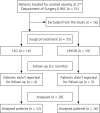Changes in levels of selected incretins and appetite-controlling hormones following surgical treatment for morbid obesity
- PMID: 26649096
- PMCID: PMC4653250
- DOI: 10.5114/wiitm.2015.54003
Changes in levels of selected incretins and appetite-controlling hormones following surgical treatment for morbid obesity
Abstract
Introduction: The hormonal brain-gut axis is a crucial element in appetite control and the response to surgical treatment for super obesity. However, mechanisms underlying the metabolic response to surgical treatment for morbid obesity are still not clearly specified.
Aim: To evaluate and compare the effects of surgical treatment for super obesity by laparoscopic sleeve gastrectomy (LSG) and by laparoscopic Roux-en-Y gastric bypass (LRYGB) on selected incretins and appetite-controlling hormones.
Material and methods: Thirty-five patients were enrolled in a prospective study. Laparoscopic sleeve gastrectomy was performed in 45.8% of patients, and LRYGB in the remaining 54.2% of patients. Before the procedure fasting blood serum was collected from patients and preserved, to determine levels of selected incretins and brain-gut hormones: glucagon-like peptide 1 (GLP-1), peptide YY (PYY), leptin, and ghrelin.
Results: Twenty-eight patients came to a follow-up visit 12 months after the surgery. In these patients selected parameters were determined again. The percentage weight loss was 58.8%. The ghrelin levels had decreased, and no statistically significant difference was observed between the two procedures. After both surgical procedures a statistically significant reduction in the leptin level was also observed. Peptide YY levels statistically significantly increased in the whole studied group. The GLP-1 level increased after the surgical procedure. However, the observed change was not statistically significant.
Conclusions: Both treatment methods result in modification of secretion patterns for selected gastrointestinal hormones, and this was considered to be a beneficial effect of bariatric treatment. The laparoscopic sleeve gastrectomy, being a procedure resulting in a metabolic response, seems to be an equally effective method for treatment of super obesity and comorbidities as the laparoscopic gastric bypass.
Keywords: Roux-en-Y gastric bypass (RYGB); bariatric surgery; ghrelin; glucagon-like peptide 1; laparoscopic sleeve gastrectomy (LSG); leptin.
Figures






Similar articles
-
Effect of laparoscopic Roux-en-Y gastric bypass versus laparoscopic sleeve gastrectomy on fasting gastrointestinal and pancreatic peptide hormones: A prospective nonrandomized trial.Surg Obes Relat Dis. 2018 Oct;14(10):1521-1529. doi: 10.1016/j.soard.2018.06.003. Epub 2018 Jun 14. Surg Obes Relat Dis. 2018. PMID: 30449509 Clinical Trial.
-
Differential effects of laparoscopic sleeve gastrectomy and laparoscopic gastric bypass on appetite, circulating acyl-ghrelin, peptide YY3-36 and active GLP-1 levels in non-diabetic humans.Obes Surg. 2014 Feb;24(2):241-52. doi: 10.1007/s11695-013-1066-0. Obes Surg. 2014. PMID: 23996294 Free PMC article.
-
Weight loss, appetite suppression, and changes in fasting and postprandial ghrelin and peptide-YY levels after Roux-en-Y gastric bypass and sleeve gastrectomy: a prospective, double blind study.Ann Surg. 2008 Mar;247(3):401-7. doi: 10.1097/SLA.0b013e318156f012. Ann Surg. 2008. PMID: 18376181 Clinical Trial.
-
Are the Changes in Gastrointestinal Hormone Secretion Necessary for the Success of Bariatric Surgery? A Critical Review of the Literature.Obes Surg. 2021 Oct;31(10):4575-4584. doi: 10.1007/s11695-021-05568-7. Epub 2021 Jul 25. Obes Surg. 2021. PMID: 34304379 Review.
-
Comparative analysis of weight loss and resolution of comorbidities between laparoscopic sleeve gastrectomy and Roux-en-Y gastric bypass: A systematic review and meta-analysis based on 18 studies.Int J Surg. 2020 Apr;76:101-110. doi: 10.1016/j.ijsu.2020.02.035. Epub 2020 Mar 6. Int J Surg. 2020. PMID: 32151750
Cited by
-
Recent advances in the modification of taste and food preferences following bariatric surgery.Rev Endocr Metab Disord. 2016 Jun;17(2):195-207. doi: 10.1007/s11154-016-9365-0. Rev Endocr Metab Disord. 2016. PMID: 27245858 Review.
-
Association Between Gut Regulatory Hormones and Post-operative Weight Loss Following Gastrectomy in Patients With Gastric Cancer.J Neurogastroenterol Motil. 2022 Jul 30;28(3):409-417. doi: 10.5056/jnm21145. J Neurogastroenterol Motil. 2022. PMID: 35799234 Free PMC article.
-
Desire for Core Tastes Decreases After Sleeve Gastrectomy: a Single-Center Longitudinal Observational Study with 6-Month Follow-up.Obes Surg. 2017 Nov;27(11):2919-2926. doi: 10.1007/s11695-017-2718-2. Obes Surg. 2017. PMID: 28560529
-
Ghrelin signalling is dysregulated in male but not female offspring in a rat model of maternal vertical sleeve gastrectomy.J Neuroendocrinol. 2021 Jan;33(1):e12913. doi: 10.1111/jne.12913. Epub 2020 Nov 10. J Neuroendocrinol. 2021. PMID: 33169872 Free PMC article.
-
Type 2 Diabetes Mellitus and Preoperative HbA1c Level Have no Consequence on Outcomes after Laparoscopic Sleeve Gastrectomy-a Cohort Study.Obes Surg. 2019 Sep;29(9):2957-2962. doi: 10.1007/s11695-019-03936-y. Obes Surg. 2019. PMID: 31087237
References
-
- Maggard MA, Shugarman LR, Suttorp M, et al. Meta-analysis: surgical treatment of obesity. Ann Intern Med. 2005;142:547–59. - PubMed
-
- Buchwald H, Estok R, Fahrbach K, et al. Trends in mortality in bariatric surgery: a systematic review and meta-analysis. Surgery. 2007;142:621–32. discussion 632-5. - PubMed
-
- Hameed S, Dhillo WS, Bloom SR. Gut hormones and appetite control. Oral Dis. 2009;15:18–26. - PubMed
-
- Buchwald H, Avidor Y, Braunwald E, et al. Bariatric surgery: a systematic review and meta-analysis. JAMA. 2004;292:1724–37. - PubMed
-
- Pournaras DJ, Le Roux CW. The effect of bariatric surgery on gut hormones that alter appetite. Diabetes Metab. 2009;35:508–12. - PubMed
LinkOut - more resources
Full Text Sources
Other Literature Sources
Research Materials
